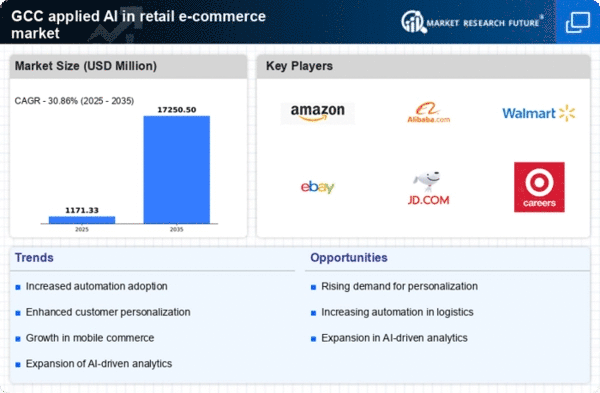Rise of Mobile Commerce
The market is significantly impacted by the rise of mobile commerce, particularly in the GCC region. With the proliferation of smartphones and improved internet connectivity, consumers are increasingly turning to mobile devices for shopping. Recent statistics reveal that mobile commerce accounts for over 50% of total e-commerce sales in the GCC, highlighting a shift in consumer behavior. Retailers are responding by optimizing their platforms for mobile use and incorporating AI technologies to enhance user experience. Features such as chatbots and virtual assistants are becoming commonplace, providing instant support and personalized recommendations. This trend suggests that the applied ai-in-retail-e-commerce market must adapt to the mobile-first approach to capture the growing segment of mobile shoppers.
Investment in AI Technologies
The market is experiencing a notable increase in investment in AI technologies. Retailers in the GCC are recognizing the competitive advantage that AI can provide, leading to substantial financial commitments towards AI-driven solutions. Reports indicate that investments in AI within the retail sector are projected to reach $5 billion by 2026 in the GCC. This influx of capital is likely to accelerate the development and implementation of innovative AI applications, ranging from customer service automation to advanced analytics. As businesses strive to enhance operational efficiency and customer engagement, the focus on AI technologies is expected to be a key driver of growth in the applied ai-in-retail-e-commerce market.
Regulatory Support for AI Adoption
The market is benefiting from increasing regulatory support for AI adoption in the GCC. Governments in the region are actively promoting the use of AI technologies to enhance economic growth and innovation. Initiatives aimed at fostering a conducive environment for AI development are emerging, with policies that encourage investment and research in AI applications. This regulatory backing is likely to facilitate the integration of AI in retail operations, enabling businesses to harness the full potential of AI technologies. As a result, the applied ai-in-retail-e-commerce market is expected to experience accelerated growth, driven by supportive policies that promote AI adoption and innovation.
Consumer Demand for Personalized Experiences
The market is witnessing a surge in consumer demand for personalized shopping experiences. As consumers increasingly expect tailored recommendations and customized interactions, retailers are leveraging AI technologies to analyze customer data and preferences. This trend is particularly pronounced in the GCC region, where a diverse population seeks unique shopping experiences. According to recent studies, 70% of consumers in the GCC express a preference for personalized offers, indicating a significant opportunity for retailers to enhance customer engagement. By utilizing AI-driven insights, businesses can create targeted marketing strategies that resonate with individual preferences, thereby driving sales and fostering brand loyalty. This growing expectation for personalization is likely to shape the future landscape of the applied ai-in-retail-e-commerce market, compelling retailers to invest in advanced AI solutions.
Integration of AI in Supply Chain Management
The market is increasingly influenced by the integration of AI technologies in supply chain management. Retailers in the GCC are recognizing the potential of AI to optimize inventory management, demand forecasting, and logistics operations. By employing AI algorithms, businesses can analyze vast amounts of data to predict consumer demand more accurately, reducing excess inventory and minimizing stockouts. Reports indicate that companies utilizing AI in their supply chains can achieve cost reductions of up to 20%. This efficiency not only enhances operational performance but also improves customer satisfaction by ensuring product availability. As the applied ai-in-retail-e-commerce market continues to evolve, the integration of AI in supply chain processes is expected to become a critical driver of growth and competitiveness.
















